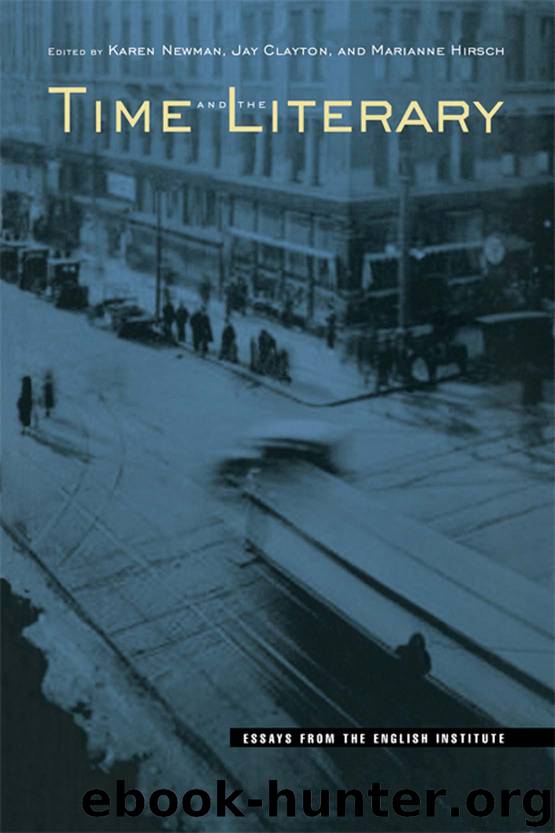Time and the Literary (Essays from the English Institute) by Karen Newman & Jay Clayton & Marianne Hirsch

Author:Karen Newman & Jay Clayton & Marianne Hirsch
Language: eng
Format: epub
ISBN: 9781136715679
Publisher: Taylor and Francis
Published: 2013-09-13T00:00:00+00:00
NOTES
I am grateful to the program committee of the English Institute for inviting me to reconsider Paul de Man and to the membership for searching conversation from the floor; to Barbara Johnson for her colleagueship in sharing the platform; and to the friends and colleagues whose comments and responses supported my work on this essay. I think particularly of Paul Bové, Jay Clayton, Daniel O'Hara, Marie-Rose Logan, Andrew Parker, and Donald Pease.
1.De Man's is one of fifteen names to figure in the table of contents, and, I find, his index entry extends for more lines than any other author's, slightly exceeding Matthew Arnold and William Wordsworth. Jonathan Arac, Critical Genealogies (New York: Columbia University Press, 1987).
2.For my work on the Cambridge History of American Literature (1995), I was concerned with the necessity to make close reading part of historiographic practice. See Jonathan Arac, “Problems of Nationalism in American Literary Historiography: The Case of the New Cambridge History.” REAL—Yearbook of Research in English and American Literature (Tübingen: Gunter Narr Verlag) vol. 11 (1995), p. 16. In Huckleberry Finn As Idol and Target (1997), I was reading pat terns of repetition and silence in the critical responses to a major text.
3.Reading Paul de Man taught a generation of American critics what critical reading might mean. His philosophic reach, his self-critical scruple, and his inventive verbal precision combined to form an inimitable but deeply influential style. . . . Throughout his career, Romanticism was the historical problem that most preoccupied de Man, and no critic writing English in our time equalled his power to convey problematic preoccupation. Too radical to abide any form of cover-up, he practiced the vigilant burrowing that defines one pole of intellectual activity. Thus, in the new essay on Kleist, he finds that the romantic ‘aesthetic ideology’ has succeeded ‘to the point of hiding the violence that makes it possible.’ The praise that he granted Yeats applies equally to de Man's own work: it constantly warns ‘against the danger of unwarranted hopeful solutions.’” Jacket copy on Paul de Man, The Rhetoric of Romanticism (New York: Columbia University Press, 1984). The omitted sentence describes the volume's contents.
4.See Werner Hamacher, Neil Hertz, and Thomas Keenan, eds., Paul de Man, Wartime Journalism, 1939–1943 (Lincoln: University of Nebraska Press, 1988) and its companion volume, by the same editors, Responses: On Paul de Man's Wartime Journalism (Lincoln: University of Nebraska Press, 1989).
5.For an account of de Man's career, see Lindsay Waters, “Introduction: Paul de Man: Life and Works,” Paul de Man, Critical Writings, 1953–1978, ed. Lindsay Waters, (Minneapolis: University of Minnesota Press, 1989), pp. ix–lxxiv.
6.See “Coleridge” (1840), in The Philosophy of John Stuart Mill, ed. Marshall Cohen (New York: Random House, 1961), p. 58.
7.From de Man's 1962 review of Harold Bloom's Visionary Company, in Critical Writings, p. 92.
8.Paul de Man, “Literary History and Literary Modernity,” in his Blindness and Insight: Essays in the Rhetoric of Contemporary Criticism (New York: Oxford University Press, 1971), pp. 142–65. Reprinted here as chapter 6.
9.“Allegories of Reading started out as a historical study and ended up as a theory of reading.
Download
This site does not store any files on its server. We only index and link to content provided by other sites. Please contact the content providers to delete copyright contents if any and email us, we'll remove relevant links or contents immediately.
The Rules Do Not Apply by Ariel Levy(4957)
Bluets by Maggie Nelson(4548)
Too Much and Not the Mood by Durga Chew-Bose(4338)
Pre-Suasion: A Revolutionary Way to Influence and Persuade by Robert Cialdini(4224)
The Motorcycle Diaries by Ernesto Che Guevara(4089)
Walking by Henry David Thoreau(3953)
Schaum's Quick Guide to Writing Great Short Stories by Margaret Lucke(3375)
What If This Were Enough? by Heather Havrilesky(3308)
The Daily Stoic by Holiday Ryan & Hanselman Stephen(3304)
The Day I Stopped Drinking Milk by Sudha Murty(3196)
The Social Psychology of Inequality by Unknown(3020)
Why I Write by George Orwell(2945)
Letters From a Stoic by Seneca(2794)
A Short History of Nearly Everything by Bryson Bill(2689)
A Burst of Light by Audre Lorde(2597)
Insomniac City by Bill Hayes(2545)
Feel Free by Zadie Smith(2476)
Upstream by Mary Oliver(2388)
Miami by Joan Didion(2365)
